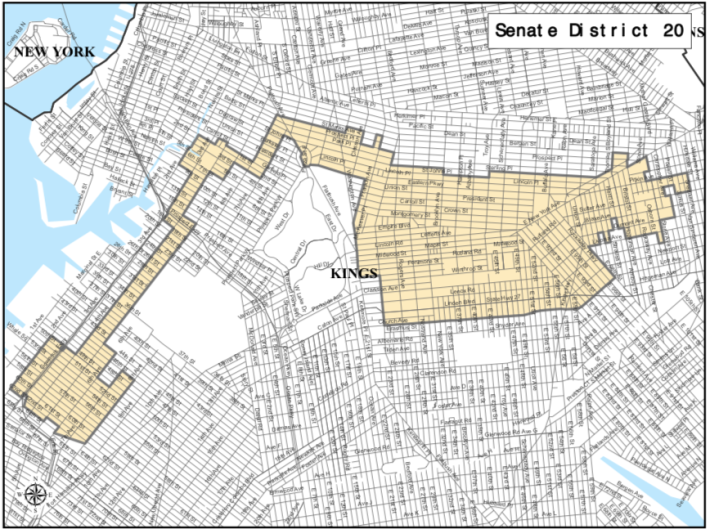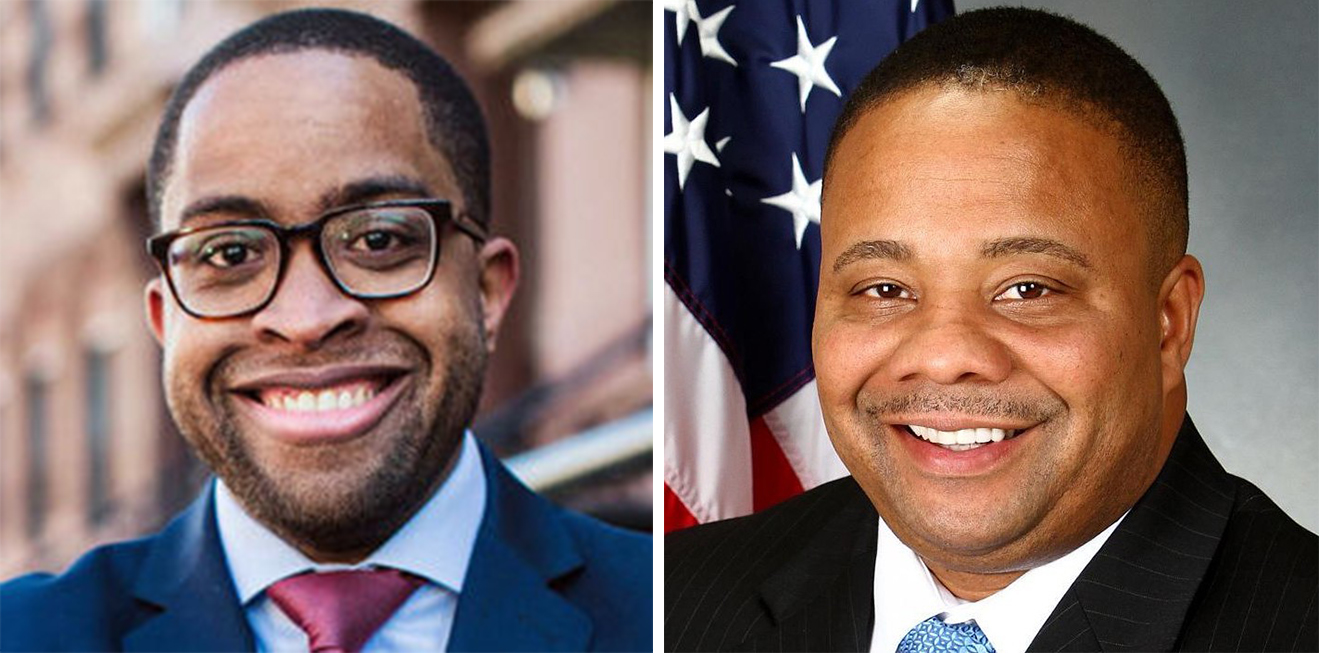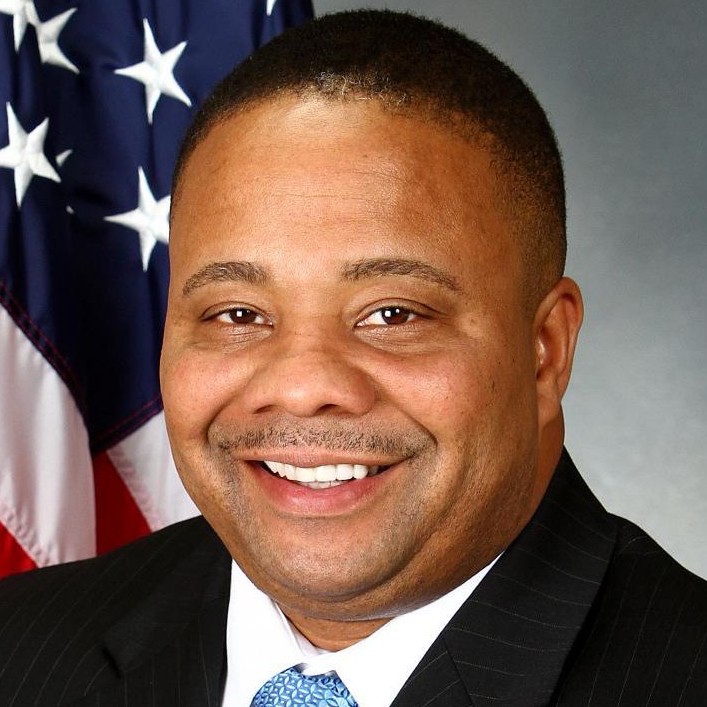Insurgent candidates are challenging incumbents in Albany this year like never before — and for good reason: The State Senate's failure to pass speed camera legislation this summer, the legislature's stall on congestion pricing, and the upper chamber's general political dysfunction are motivating people to focus on whether Albany itself is working.
So Streetsblog asked candidates in the upcoming Democratic primaries to answer basic questions about street safety and mobility. Today we look at the 20th Senate District in Brooklyn: Zellnor Myrie against incumbent Jesse Hamilton. Hamilton has been under fire because he was a member of the former Independent Democratic Conference, which caucused with Republicans, giving the GOP control of the Senate. In this race, StreetsPAC endorsed Myrie.
Here are the candidates' answers unedited (yes, Sen. Hamilton's answers were this short), with a map of the district at the bottom of this post:
Do you support congestion pricing in New York City? If so, in what form? If not, why not?
MYRIE: Plans to institute congestion pricing have been under discussion for years, and it’s time they were implemented. This is sound environmental policy, transit policy, and infrastructure policy — it would curb car emissions; encourage use of more sustainable transportation options (public transit, cycling, walking); and provide needed funds for infrastructure improvement, particularly MTA repairs.
In terms of the form, I don’t think enough research has been done into which model of congestion pricing would be best for New Yorkers. The last thing we want to do is institute a congestion pricing plan which financially burdens working families. We need more studies done into whether we should set a flat rate on vehicles, change pricing based on the date and time, or by designating specific congestion zones.
HAMILTON: I do support congestion pricing as long as the revenue raised is dedicated solely to funding public transit in NYC.
Subway ridership is down and New York's buses are slower than ever. What will you do in Albany/are doing in Albany to fix it?
MYRIE: We desperately need more investments in the MTA to repair an archaic signal system and century-old tunnels, and to address the increasing delays on the NYC subway and the LIRR that prevent people from making it to work and school on time. I will fight in the State Senate to secure more funding for our subway system through congestion pricing and a millionaire’s tax, not from increased fares.
HAMILTON: We need more funding, plain and simple. I support expanding the millionaire’s tax and congestion pricing to raise revenue that can be focused on mass transit.
MTA capital projects routinely cost five times as much as transit projects in other cities. How will you exert pressure on the MTA to control costs?
MYRIE: There are a few measures we can take to reduce the cost of MTA projects. The first is passing the NY Health Act. We could reduce the cost of construction projects by 1/10th if these projects weren’t required to pay for employee healthcare coverage. The second is instituting strict oversight by city and state officials to ensure efficient staffing, vendor competition, and scant use of consultants. Lastly, if we also make regular investments in our subways system to ensure it is fully functional and well maintained than we will we be able to reduce cost long term.
HAMILTON: We need to utilize Design Build more often. Our subway system is 100 years old and we need to be proactive with upkeep and technological advancements or it will fall into a greater state of disrepair and end up costing us much more down the line.
How would you make streets in your district safer for walking and biking? Do you support the city's construction of protected bike lanes? If so, why? If not, why not?
MYRIE: One of the biggest things I could do as State Senator to keep our streets safer for pedestrians and cyclist is fight to fund our speed camera program. It is a shame that funding was allowed to lapse and we have already seen reckless drivers taking advance.
I also support the city’s new protected bike lanes. I believe they are the right step in making New York a more bike friendly city and reducing the accidents involving cyclist.
HAMILTON: We need to implement traffic calming measures such as roundabouts and protected bike lanes. We also need to reinstate speed cameras at schools immediately. The Senate Republicans refusal to pass this commonsense legislation is abhorrent.
What is the single biggest thing the state should do to get reckless drivers off New York City streets?
MYRIE: As I previously said, fighting to fund our speed camera program. It is critical to fight for speed cameras in all school zones - these cameras have shown to significantly decrease speeding, one of the top causes of traffic deaths. Vision Zero is working, and Albany should not allow the speed camera program to expire.
HAMILTON: We need to actually enforce our traffic laws and hold reckless drivers accountable — meaning charging them with manslaughter when they kill cyclists and pedestrians and taking away people’s driver’s licenses for unsafe or reckless driving.
Is there a safety, design or enforcement strategy that is not being deployed that you think is vital to making our roadways, sidewalks and public spaces work better for everyone? (Hint: This is a "visionary" question, so don't think small.)
MYRIE: I believe we should to turn AMTRACK [sic] into a high-speed rail service. One of the best things we can do for the safety of our roads is to reduce the number of people driving on them. Hundreds of thousands of people commute by driving in and out of New York City and millions of New Yorkers commute by driving upstate.
Creating a 21st century high-speed rail service could take thousands of vehicles off the road and completely transform communities upstate. Such services have been implemented across the world with huge success and I think the same success could happen here in New York.
HAMILTON: We need to completely reimagine our public spaces and streetscapes in NYC.
Pedestrian plazas are great, as are other ways to reclaim public space, like summer streets.
We should actively work for more traffic calming measures and speed cameras, create protected bike lanes, and enforce our traffic laws for aggressive and reckless drivers.
How often do you bike to the office (be honest)?
MYRIE: I live within walking distance of my office so I usually walk to the office!
HAMILTON: I do not bike to the office.









